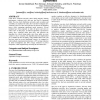Free Online Productivity Tools
i2Speak
i2Symbol
i2OCR
iTex2Img
iWeb2Print
iWeb2Shot
i2Type
iPdf2Split
iPdf2Merge
i2Bopomofo
i2Arabic
i2Style
i2Image
i2PDF
iLatex2Rtf
Sci2ools
GLVLSI
2010
IEEE
2010
IEEE
Timing-driven variation-aware nonuniform clock mesh synthesis
Clock skew variations adversely affect timing margins, limiting performance, reducing yield, and may also lead to functional faults. Non-tree clock distribution networks, such as meshes and crosslinks, are employed to reduce skew and also to mitigate skew variations. However, these networks incur an increase in dissipated power while consuming significant metal resources. Several methods have been proposed to trade off power and wires to reduce skew. In this paper, an efficient algorithm is presented to reduce skew variations rather than skew, and prioritize the algorithm for critical timing paths, since these paths are more sensitive to skew variations. The algorithm has been implemented for a standard 65 nm cell library using standard EDA tools, and has been tested on several benchmark circuits. As compared to other methods, experimental results show a 37% average reduction in metal consumption and 39% average reduction in power dissipation, while insignificantly increasing the maxi...
| Added | 10 Jul 2010 |
| Updated | 10 Jul 2010 |
| Type | Conference |
| Year | 2010 |
| Where | GLVLSI |
| Authors | Ameer Abdelhadi, Ran Ginosar, Avinoam Kolodny, Eby G. Friedman |
Comments (0)

